2019-2020 Annual Report
A Year for the Books
A Year for the Books
A core component of our mission as the John Mitchell, Jr. Program is the reframing of the relationship of the past to the present. We were founded at the start of the 2019–2020 academic year at George Mason University’s Jimmy and Rosalynn Carter School for Peace and Conflict Resolution to carry out this mission, and as the first year of our operation, 2019–2020 has been a year for the books.
In building up a portfolio of research and practice rooted in critical historiography, narrative change, and conflict resolution principles, we are laying a strong foundation for the work of our growing community of scholars, researchers, and practitioners. Both the establishment of our social media presence and the development of a number of digital humanities initiatives have anchored our approach to narrative change through the centering of marginalized, overlooked, and underrepresented voices, while our growing series of virtual events has provided a platform for a dynamic and informed conversation on the two pandemics we are currently facing: systemic racism and COVID-19.
Read our first annual report to see how we have spent our first year as a program dedicated to helping realize a more equitable and just world.

In June 2020, following the murder of George Floyd in Minneapolis on May 25, the George Mason University community gathered on the Fairfax campus in support of Black Lives Matter. Participants marched from the Field House to the statue of George Mason, the university’s namesake, who enslaved more than 100 people of African origin/descent and who built his wealth, well-being, and legacy on their forced labor. The march included multiple speeches from Mason students and community members who challenged systemic, anti-Black racism in the United States and across the world and interrogated its manifestations in the academic space, including in the form of the statue of George Mason on Fairfax Campus. Mitchell Program staff members joined the march in solidarity. (Photo by Ron Aira/Creative Services/ George Mason University)
Anchors for Narrative Change: Social Media, Digital Humanities, and Events
Narrative change is central to our work. At the Mitchell Program, we believe that change to the material conditions of White supremacy and systemic racism in the United States—which manifest in the legal system, institutional policies, and socioeconomic lived experiences—cannot be realized without changes to narratives that foster ignorance, discrimination, hatred, and oppression against marginalized and minoritized racial communities. As such, our program’s research and practice aims to facilitate greater access to narratives that seek to center marginalized and minoritized voices in service of affirming the personhood of Black people, Indigenous people, and other People of Color while deconstructing the harmful narratives of White supremacy.
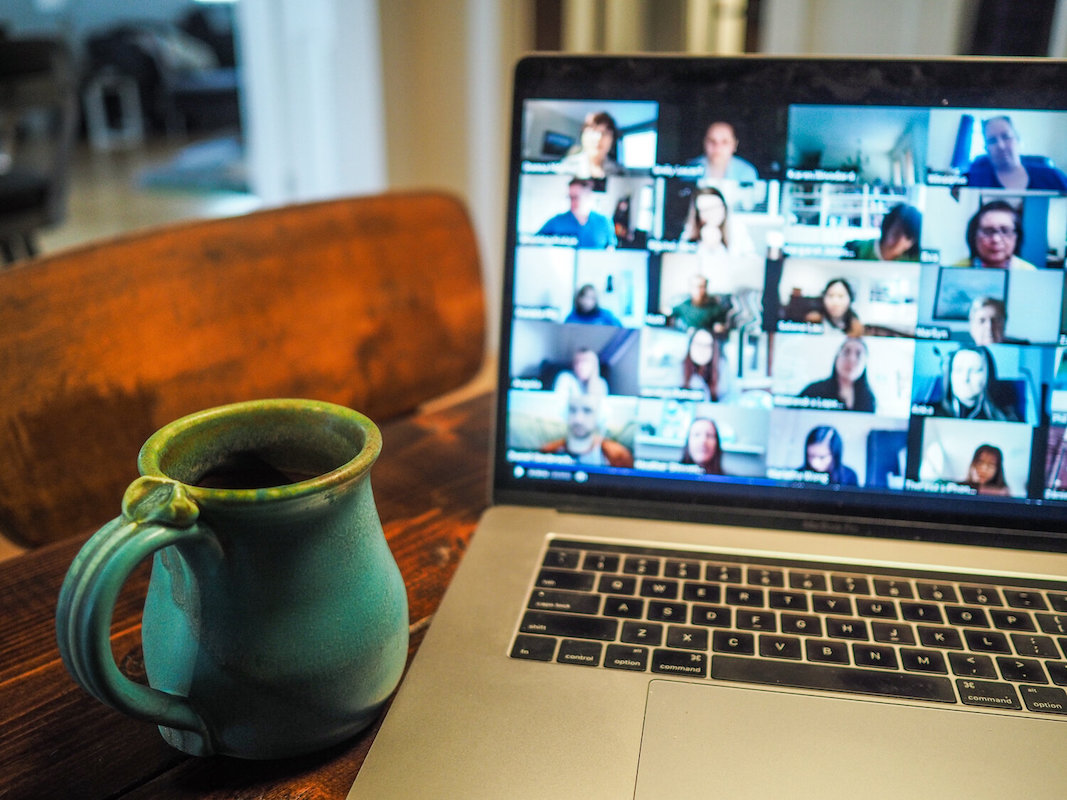
Juneteenth: An Explainer
In commemoration of Juneteenth (June 19), also known as Emancipation Day, we put together a social media campaign that highlighted the holiday’s origins in the emancipation of enslaved African Americans and explained why its commemoration is important to both the honoring of Black and U.S. history and the continuation of the struggle for racial justice in the United States.
Celebrating Black Joy
Pride Month 2020 Profiles
Throughout Pride Month, which is celebrated every year in June, we did a series of posts highlighting the words, lives, and legacies of prominent members of the LGBTQ+ community who are Black or are part of other Communities of Color. Our posts highlighted the voices of literary figures, activists, and policymakers, including Andrea Jenkins, Phillipe Cunningham, Marsha P. Johnson, Lorraine Hansberry, Kehinde Wiley, Langston Hughes, Pauli Murray, Miss Major Griffin-Gracy, Sylvia Rivera, and Sara Hegazy.
Our program was founded by Dr. Charles L. Chavis, Jr., a historian of the Early Civil Rights movement and the legacy of racial terror lynching in the United States. When Dr. Chavis arrived at the Carter School in 2019, he brought with him a determination to help the next generation of conflict resolution scholars and practitioners to incorporate deep and critical knowledge of history into the work of conflict prevention, resolution, and transformation.
At the Mitchell Program, our team of graduate and undergraduate associates work closely with Dr. Chavis and each other to develop digital humanities research initiatives that will not only add to the academic literature on history, race, and justice, but will also be accessible to the larger public in a digital, online, format.
During the 2019–2020 academic year, the Mitchell Program team started building the foundation for the program’s digital humanities work, including through the launch of an online literary publication and the compiling of various resources into public-facing exhibits and statements.
Our team also began laying the groundwork for a variety of digital humanities initiatives to be completed in the 2020–2021 academic year and beyond. For more information about our upcoming digital humanities initiatives, see the “Grant Activities” section later in this report.
Read the news article: “Dr. Charles Chavis will link the past with the present at S-CAR”
Launch of Freedom’s Plow
In July 2020, we launched the first issue of our online literary publication, Freedom’s Plow. Named after the Langston Hughes poem of the same name, Freedom’s Plow seeks to provide a platform for people of all backgrounds and experiences to contribute essays, interviews, artwork, fiction, poetry, and multimedia pieces on subjects at the intersection of history, justice, and race.
Interfaith Friendship & Activism
In commemoration of the 57th Anniversary of the March on Washington for Jobs and Freedom, our program coordinator Ajanet Rountree put together a digital exhibit highlighting interfaith friendship and activism on racial justice by highlighting the contributions of Rabbi Joachim Prinz and Rabbi Abraham Joshua Heschel to the Civil Rights Movement.
A Letter to White America
Drawing upon the history of racial terror lynching in the United States, our team members put together a statement on the 57th anniversary of the 1963 March on Washington for Jobs and Freedom to condemn the modern-day lynchings of Black people by police personnel and to call on White communities across America to commit to dismantling systems of White supremacy and anti-Black racism.
Academia is many things, but accessible to the wider public is rarely one of them. Over the past year at the Mitchell Program, we have been hard at work putting together a variety of public events on subjects at the intersection of history, justice, and race. Our goal with our events is not only to bring academic knowledge to our broader communities but also to engage people of all backgrounds and experiences on their reflections, knowledge, and questions regarding the history of race in the United States and the struggle for racial justice.
A full list of our team’s events and presentations can be found at the end of this report.
Mondays in June series
Throughout June 2020, the Mitchell Program partnered with Busboys and Poets and the Maryland Lynching Memorial Project for a weekly virtual town hall series featuring academics, authors, and activists in conversation with Dr. Chavis and Andy Shallal.
The Tenacity of Racism and Its Challenge to Religious Faith
On August 24th, 2020, in advance of the 57th Anniversary of the March on Washington for Jobs and Freedom, we partnered with the Carter School, Busboys and Poets, and the Black and Jewish forum to hold a discussion on the role of religious faith in the struggle for racial justice.
The event featured Dr. Susannah Heschel (daughter of Rabbi Abraham Joshua Heschel), Jonathan Prinz (son of Rabbi Joachim Prinz), and Yolanda Savage-Narva (Executive Director of Operation Understanding DC).
Commitment March on Washington
On August 28th, 2020, the National Action Network organized a Commitment March in Washington, D.C., to recognize the 57th Anniversary of the March on Washington and to call for the end of police brutality against Black communities in the United States. JMJP team members joined the march in D.C. following a morning of connecting with the broader community during a tabling event at Busboys and Poets.
2019–2020 in Numbers
VIEWS OF LIVESTREAMS
between June 1 – Sept 11, 2020
EVENT RSVPS
between June 1 – Sept 11, 2020
TOTAL ORGANIC TWITTER IMPRESSIONS
between May 20 – Sept 11, 2020
TOTAL ORGANIC FACEBOOK IMPRESSIONS
between May 21 – Sept 11, 2020
COUNTRIES REACHED BY FREEDOM’S PLOW
between July 4 – Sept 11, 2020
UNIQUE VISITORS TO FREEDOM’S PLOW
between July 4 – Sept 11, 2020
Our impact in 2019–2020
Throughout 2019-2020, the Mitchell Program contributed to the evolution of the academic literature and public discourse around history, justice, and race through a variety of avenues, including academic publications and presentations, public-facing events, and engagement with print and online media. In addition, we laid the groundwork for our upcoming research and scholarship through a variety of grant applications. In this effort, we developed partnerships and connections with a wide variety of actors working in this field, and we look forward to expanding upon these partnerships in the coming year.
Events & Presentations
Charles L. Chavis, Jr., Susannah Heschel, Jonathan Prinz, and Yolanda Savage-Narva, in conversation with Andy Shallal, “The Tenacity of Racism and Its Challenge to Religious Faith,” A Continuing Talk on Race (A.C.T.O.R.), in partnership with Busboys and Poets, Washington, D.C. (August 24, 2020).
Charles L. Chavis, Jr., and Nicholas Buccola, in conversation with Andy Shallal, “The Fire Is Upon Us,” A Continuing Talk on Race (A.C.T.O.R.), in partnership with Busboys and Poets, Washington, D.C. (August 10, 2020).
Christie Jones, Charles L. Chavis, Jr., Ajanet Rountree, Iris Barnes, and Laura Brannan, “Balm over Gilead: The NMAAHC As a Site of Conscience,” 42nd Annual Association of African American Museums Conference Washington, D.C. (August 6, 2020).
Charles L. Chavis, Jr., Rabbi Jeffrey Saxe, and LaNitra Berger, “Why Racism Matters to Jews,” Pozez Jewish Community Center of Northern Virginia, Fairfax, VA (July 29, 2020).
Charles L. Chavis, Jr., “American Trailblazers Who Fought Persecution at Home and Abroad,” United States Holocaust Memorial Museum, Washington, D.C. (July 1, 2020).
Charles L. Chavis, Jr., and Tehama Lopez Bunyasi, in conversation with Andy Shallal, “Stay Woke: All Black Lives Matter,” A Continuing Talk on Race (A.C.T.O.R.), in partnership with Busboys and Poets, Washington, D.C. (July 13, 2020).
Charles L. Chavis, Jr., and Peniel E. Joseph, in conversation with Andy Shallal, “Mondays in June: Symbols and Structures of White Supremacy,” A Continuing Talk on Race (A.C.T.O.R.), in partnership with the Maryland Lynching Memorial Project and Busboys and Poets, Washington, D.C. (June 29, 2020).
Charles L. Chavis, Jr., Rev. Canon Nontombi Naomi Tutu, and Mungi Ngomane, in conversation with Andy Shallal, “Mondays in June: On Faith and Racial Justice,” A Continuing Talk on Race (A.C.T.O.R.), in partnership with the Maryland Lynching Memorial Project and Busboys and Poets, Washington, D.C. (June 22, 2020).
Ajanet Rountree, Brandye Lee, Janice Curtis Greene, and Victoria Stanley, in “Virtual Juneteenth Celebration,” hosted virtually by the Hosanna School Museum, Darlington, MD (June 19, 2020).
Charles L. Chavis, Jr., Huwe Burton, Natasha Pratt-Harris, and Mecca Lewis-Shukar, “Just Mercy Film Discussion (Juneteenth Celebration),” Harve de Grace Arts Collective, Harve de Grace, MD (June 19, 2020).
Charles L. Chavis, Jr., Stanley Johnson, Iyelli Ichile, Lula A. Beatty, Tyler Smith, Vivian Ebisike, and Omar Eaton-Martínez, “‘I Can’t Breathe’: A Panel Discussion,” Prince George’s County Department of Parks and Recreation, Natural and Historical Resources Division, Riverdale, MD (June 18, 2020).
Charles L. Chavis, Jr., Will Schwarz, and Corey J. Henderson, in conversation with Andy Shallal, “Mondays in June: Screening/Discussion – Outrage in Rockland: The Lynching of Howard Cooper,” A Continuing Talk on Race (A.C.T.O.R.), in partnership with the Maryland Lynching Memorial Project and Busboys and Poets, Washington, D.C. (June 15, 2020).
Charles L. Chavis, Jr., and Eddie S. Glaude, Jr., in conversation with Andy Shallal, “Mondays in June: Confronting Two Pandemics: Racism and Covid-19,” A Continuing Talk on Race (A.C.T.O.R.), in partnership with the Maryland Lynching Memorial Project and Busboys and Poets, Washington, D.C. (June 8, 2020).
Charles L. Chavis, Jr., Gina Lewis, and Elliott Spillers, “Just Mercy: First Thursday Film Discussion,” Maryland Lynching Memorial Project, Towson, MD (June 4, 2020).
Charles L. Chavis, Jr., and Tim Wise in conversation with Andy Shallal, “Mondays in June: On Whiteness and Anti-Racism,” A Continuing Talk on Race (A.C.T.O.R.), in partnership with the Maryland Lynching Memorial Project and Busboys and Poets, Washington, D.C. (June 1, 2020).
Charles L. Chavis, Jr., “The Rabbi Edward Israel and the Black-Jewish Alliance,” Judaic Studies Program, School of World Studies, College of Humanities and Sciences, Virginia Commonwealth University, Richmond, VA (February 18, 2020).
Charles L. Chavis, Jr,. and Deb Winer, “Responding to Legacies of Discrimination: Jewish and African American Communities in Baltimore,” Teachers Workshop, Institute for Islamic, Christian, and Jewish Studies, Jewish Museum of Maryland, Baltimore, MD (December 4, 2019).
Charles L. Chavis, Jr., and Will Schwarz, “Confronting the Legacy of Racial Violence,” John Mitchell, Jr. Program for History, Justice and Race, the Carter School, George Mason University, Arlington, VA (November 18, 2019).
Charles L. Chavis, Jr., remarks with Pace J. McConkie and Victor Goode, “Lynching in Maryland: The Journey from Truth to Reconciliation,” Maryland Lynching Memorial Project Annual Conference, Morgan State University, Baltimore, MD (November 16, 2019).
Ajanet Rountree, “The Segregation of Religion: How ‘Othering’ influences society’s narrative understanding about the symbiotic relationship among racism, sexism, and the church,” University of Dayton Human Rights Conference, Going against the Grain, University of Dayton, Dayton, OH (October 4, 2019).
Publications
Books
Charles L. Chavis, Jr., and Sixte Vigny Nimuraba, For the Sake of Peace: Africana Perspectives on Racism, Justice, and Peace in America (Lanham, MD: Rowman & Littlefield, 2020).
Tehama Lopez Bunyasi and Candis Watts Smith, Stay Woke: A People’s Guide to Making All Black Lives Matter (New York: New York University Press, 2019).
Peer-Reviewed Papers
Charles L. Chavis, Jr., “Rabbi Edward L. Israel: The Making of a Progressive Interracialist 1923-1941,” Southern Jewish History, 22 (Fall 2019).
Tehama Lopez Bunyasi, “The Role of Whiteness in the 2016 Presidential Primaries,” Perspectives on Politics 17:3 (Fall 2019): 679–698.
Tehama Lopez Bunyasi, Candis Watts Smith, and Jasmine Carrera Smith, “Linked Fate over Time and Across Generations,” Politics, Groups, and Identities 7:3 (Fall 2019): 684–694.
Peer-Reviewed Book Chapters
Charles L. Chavis, Jr., “Confronting the Legacy of Lynching in Maryland: From Narrative Change to Racial Healing,” in Building Peace in America, Doug Irvin-Erickson and Emily Sample, Eds. (Lanham, MD: Rowman & Littlefield, 2020).
Oluwagbemiga Dasylva, “Race, Rituals of Dissent, and Blackness in America,” in For the Sake of Peace: Africana Perspectives on Racism, Justice and Peace in America, Charles L. Chavis, Jr., and Sixte Vigny Nimuraba, Eds. (Lanham, MD: Rowman & Littlefield, June 2020).
Ajanet Rountree, “From Birmingham to Monrovia: Black Women and the Wait/Weight of Freedom, 1960-2005” in For the Sake of Peace: Africana Perspectives on Racism, Justice and Peace in America, Charles L. Chavis, Jr., and Sixte Vigny Nimuraba, Eds. (Lanham, MD: Rowman & Littlefield, June 2020).
Op-Eds, Articles, Commentary, and Interviews
“Mason’s John Mitchell Jr. Program is putting activism in action,” George Mason University News (September 4, 2020) – Quotes from Charles L. Chavis, Jr., and Ajanet Rountree
“Carter School set to build strong foundation for Mason president’s Anti-Racism and Inclusive Excellence Task Force,” Carter School News (September 4, 2020) – Written by Audrey Williams, mention of Charles L. Chavis, Jr., Tehama Lopez Bunyasi, and Susan Hirsch
“Mason professor helps America ‘Stay Woke’,” George Mason University News (September 1, 2020) – Interview with Tehama Lopez Bunyasi
“Is the U.S. experiencing a third Reconstruction?”, Access to Excellence Podcast (August 19, 2020) – Podcast interview with Charles L. Chavis, Jr.
“Resources on anti-racism and social justice from Carter School faculty,” Carter School News (July 29, 2020) – Featuring contributions and quotes from Charles L. Chavis, Jr., Tehama Lopez Bunyasi, Douglas Irvin-Erickson, and Karina Korostelina
“A Confederate Statue is Toppled in Rural Maryland,” Washington Post (July 4, 2020) – Quotes from Charles L. Chavis, Jr.
“Harford’s Hosanna School Museum hosts Juneteenth Celebration,” Baltimore Sun (June 25, 2020) – Mention of Ajanet Rountree and Charles L. Chavis, Jr.
“A Statement by the Carter School for Peace and Conflict Resolution at George Mason University Condemning White Supremacy” (May 30, 2020) – Statement by Carter School dean Alpaslan Özerdem, written by Audrey Williams
“Maryland Court Upholds Conviction for Racist School Graffiti,” Courthouse News Service (May, 1, 2020) – Quotes from Charles L. Chavis, Jr.
“For Mason alum, COVID-19 drives home the link between public health and peacebuilding,” Carter School News (April 15, 2020) – Written by Audrey Williams
“New Campus Center To Focus On Racial Healing And Social Justice,” GMU News (February 11, 2020) – Mentions Creston Lynch, Wendi Manuel-Scott, and Charles L. Chavis, Jr.
“The Great Migration,” Baltimore Magazine (February 1, 2020) – Quotes from Charles L. Chavis, Jr.
“Facing a Painful Part of the Past,” The Beacon (January 27, 2020) – Quotes from Charles L. Chavis, Jr.
“30th annual Lynch Lecture explores the intersection of human rights and restorative justice,” Carter School News (December 20, 2019) – Written by Audrey Williams, quotes from Susan Hirsch
Grant Activities
400 Years of African-American History Commission / National Park Service
$20,000
The Mitchell Program was awarded for a digital humanities project titled, “The Hidden History of the Enslaved Naturalist, 1619 to 1863.” This project documents and compiles stories of African Americans contributing to the area of natural history between 1619 and 1863. We believe that educators, students, and amateur naturalists will benefit significantly from this project. Educators will have resources available that allow them to further diversify the representation of African American naturalists in their educational materials (e.g., lectures, reading lists, focused projects). Students and early naturalists will be exposed to a broader representation in the fields of natural history, botany, ecology, wildlife science, and conservation biology. Most importantly, recognition will be rightly attributed to those African Americans who contributed to early science but were denied the credit they deserved.
Virginia Humanities
$5,000
The Mitchell Program was awarded these funds to conduct initial research for a digital exhibit titled, “‘Lynch Law Must Go!’ – John Mitchell, Jr., Ida B. Wells, Frederick Douglass, and the Role of the Black Press in Fighting and Documenting Racial Terror Lynching in the United States.” This digital, online exhibit will document the anti-lynching work of Mitchell, with a particular focus on his work in Virginia, in the context of his collaboration with, and support of, both Wells and Douglass.
Emmett Till Cold Case Investigations Program / U.S. Department of Justice
(Pending)
The Mitchell Program has partnered with Maryland’s Office of the Attorney General (MOAG) and the Maryland Lynching Truth and Reconciliation Commission to submit an application for the Emmett Till Cold Case Investigations Program Grant provided by the Department of Justice. If received, this grant will support an initiative to expand the documentation of cases of racial terror lynching in Maryland and to support affected communities in seeking restorative justice, reconciliation, and potentially reparations in the aftermath of the over forty racially-motivated murders. JMJP Faculty Board Members supporting this work include Dr. Susan Hirsch and Dr. Tehama Lopez Buyansi.
Looking Ahead in 2020–2021: Building Bridges Between the Spheres
In our first year of operation, our dedicated team of seasoned and rising scholars, researchers, and practitioners worked together to build a strong foundation for our mission to foster narrative change, build peace, advocate for human rights, and promote racial and social justice in service of our vision of a more equitable and just world.
Throughout the 2020–2021 academic year, it is clear that we will continue to grapple with the two pandemics—systemic racism and COVID-19—as we work toward the realization of our vision. It is the goal of our team to build upon this past year’s work as we continue to carry out scholarship, research, and practice that challenges White supremacy and prioritizes racial justice.
To this end, in the coming academic year, our program will play a central role in a new initiative at George Mason University: the Anti-Racism and Inclusive Excellence Task Force. First announced in July by Mason President Gregory Washington, who began his term on July 1st, 2020, as the first Black president of George Mason University, the ARIE Task Force will develop “intentional systems and standards of anti-racism that will keep racial injustices from regenerating” at our university.
Our founding director, Dr. Chavis, our affiliated faculty member Dr. Tehama Lopez Bunyasi, and our board member Dr. Creston Lynch are among the 32 Mason community members who will serve on the core membership of the ARIE Task Force. In addition, a number of additional Carter School faculty, staff, and students—including our board member Dr. Susan Hirsch—will serve as members of the task force’s subcommittees, two of which will be chaired by Dr. Chavis (Training & Development) and Dr. Lopez Bunyasi (Curriculum & Pedagogy).
Prior to the announcement of our team’s role in the ARIE Task Force, our staff, including Christie Jones, Ajanet Rountree, and Audrey Williams, worked closely with our director, Dr. Chavis, to develop a series of recommendations and resources to inform the anti-racism efforts of George Mason University. These resources included an anti-racism statement developed for potential inclusion on syllabi.
Our role in the ARIE Task Force will be accompanied by our participation in the Carter School’s newly launched Transitioning Justice initiative, which will support the development of research initiatives around the multifaceted concept of justice and its relationship to the field of peace and conflict studies.
In addition, throughout 2020–2021, we are looking forward to continuing our narrative change efforts through a robust program of events, research, and digital humanities projects, including the following:
-
The launch of a radio show, For the Sake of Peace, in partnership with Busboys and Poets, to air weekly on Monday evenings on WPFW 89.3 FM;
-
The development of digital exhibit highlighting the hidden and overlooked contributions of enslaved African Americans to the fields of natural history, botany, ecology, wildlife science, and conservation biology; and
-
The development of a digital exhibit highlighting the anti-lynching work of John Mitchell, Jr., Ida B. Wells, and Frederick Douglass.
As we move into the 2020–2021 academic year, one principle will guide all of our initiatives: the determination to serve as a bridge between the academic and community spheres. In doing so, we will strive to serve not only as a platform where community members have wider access to robust resources on history, justice, and race, but also as a space where academics can learn from the knowledge and experiences of those who are outside of academia.
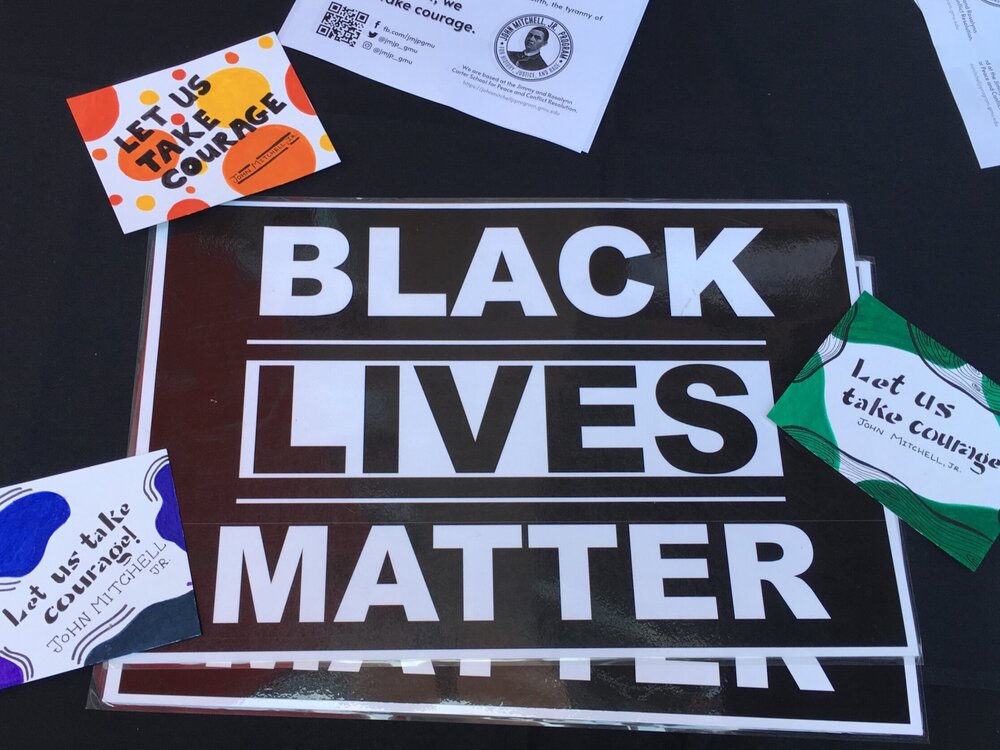
Photo of Black Lives Matter signs at the Mitchell Program’s table outside of Busboys and Poets prior to the Commitment March on August 28th, 2020. (Photo by Audrey Williams)
Read about the Carter School’s contributions:
Acknowledgements
The first year of any program’s existence is almost certainly its hardest.
The work that the Mitchell Program undertook in 2019–2020 could not have been accomplished without the dedication of its team of graduate and undergraduate students associates, nor without the support of its affiliated faculty, board members, partners, and donors.
To staff members Christie Jones, Ajanet S. Rountree, Audrey Williams, Laura Brannan, and Oluwagbemiga (Gbenga) Dasylva, we could not have done any of this powerful work without you. In addition, the Mitchell Program is extremely thankful to the scores of individuals, donors, supporters, and foundations for their support and dedication. In 2020, one foundation in particular, the Aft Chai Foundation, stood out for its transformational vision and depth of support. Special thanks as well to our student associates, faculty affiliates, associate scholars, board members, and the Jimmy and Rosalynn Carter School for Peace and Conflict Resolution at George Mason University for their contributions to and support of this dynamic first year of our programming.
– Dr. Charles L. Chavis, Jr., Founding Director of the Mitchell Program

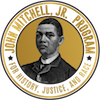

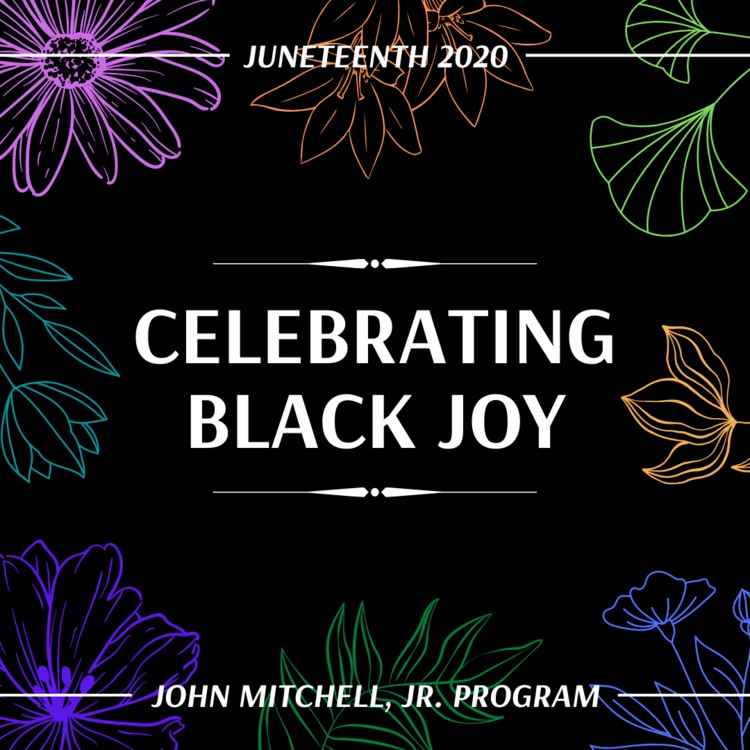


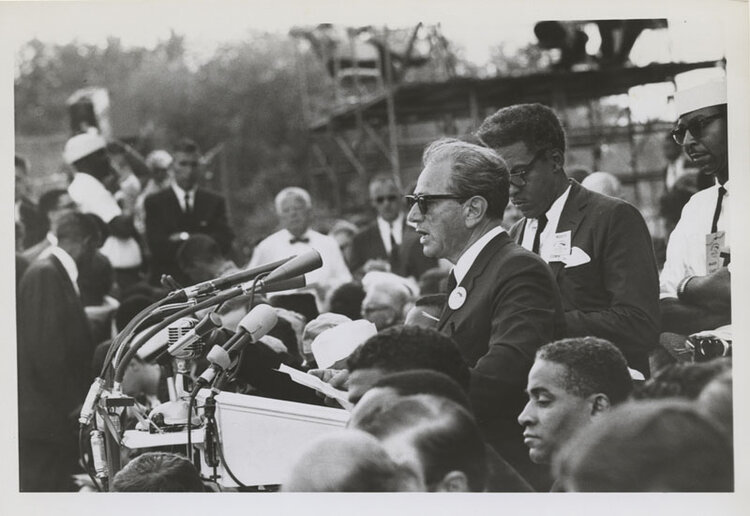
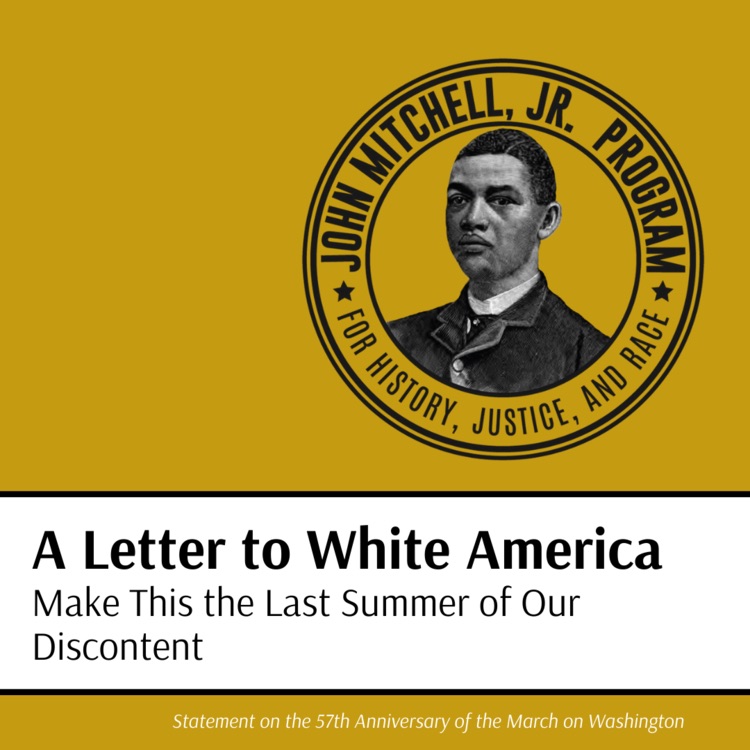

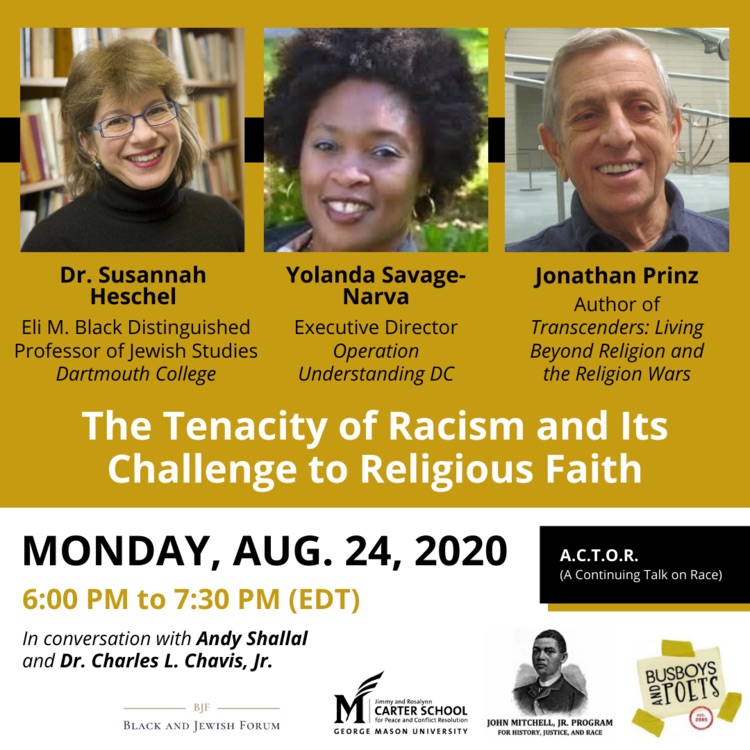
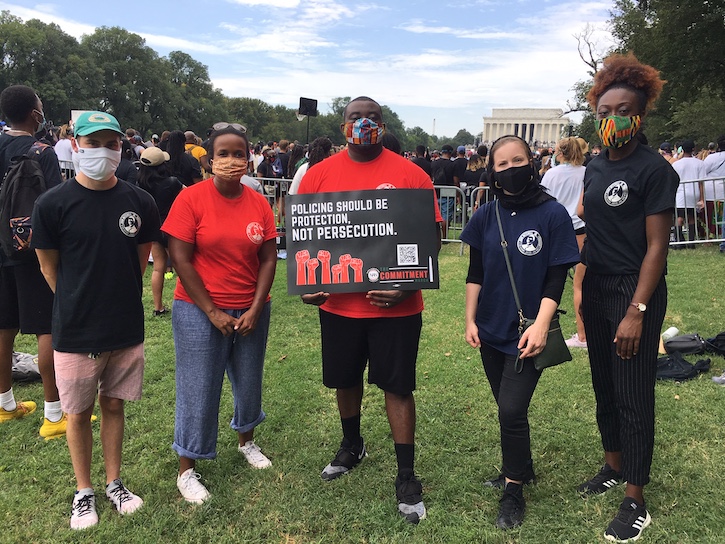
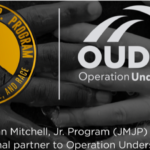
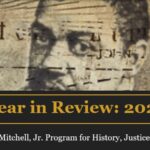
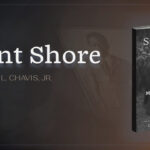
JMJP on Social Media: